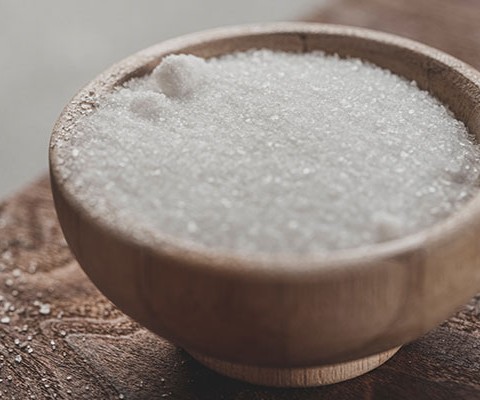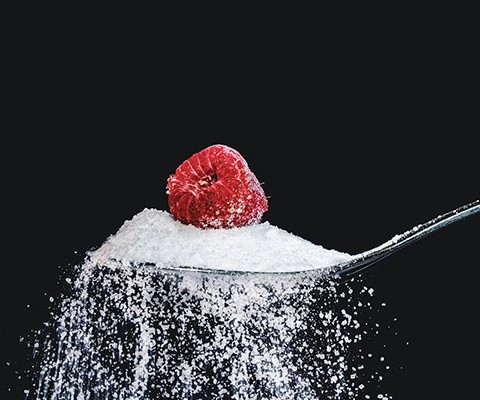Gimme Some Sugar... Or Maybe Don’t?

Is sugar bad for you?
If someone knows next to nothing about nutrition, the two things they probably would know are that:
- Vegetables are good for you
- Sugar is bad for you
From the research we have available, that person is probably only right on one of those
While it seems the mainstream media is pushing a story about sugar being the root of evil in our society every other week, should we really be labelling it as a “poison”, or are we unfairly demonising that tasty combo of fructose and glucose?
Just recently we heard discussions of governments implementing sugar taxes, or sugary drink duties, in an attempt to reduce societal sugar consumption…but is there a scientific rationale for this legislation?
Let’s take a look.

This is what the research says...
In 1997 Surwit and colleagues investigated two calorie matched diets which manipulated the amount of sugar consumed. In one group (high-sucrose) a whopping 43% of their calories came from sugar. In the other group (low-sucrose) only 4% of their calories came from sugar. While both groups lost weight, the authors concluded that high sucrose content in the diet did not adversely affect weight loss, metabolism, plasma lipids or emotional affect.
In 2000 a trial by Saris and colleagues called the CARMEN study took a number of obese adults and allocated them to either a low-fat/high-sugar diet protocol, or a low-fat/high-complex carb protocol. After 6 months, there were no significant differences in weight change between the high sugar and low sugar groups.
In 2001 in a study by West and de Looy, they compared a low-sugar diet (less than 5% of calories coming from sugar) to a sugar-containing diet (10% of calories coming from sugar) to see if weight loss was dependent on the amount of sugar in the diet. After 8 weeks, weight loss in the low-sugar group was 2.2 kg, and 3.0 kg in the sugar-containing group.
Just recently in a review paper published in February this year, authors examined whether there was a unique characteristic of sugar that could be promoting weight gain and diet-related diseases, or whether it was simply the energy content of the sugar itself. Here’s what the authors concluded... “dietary sugars are only associated with an increase in obesity when consumed as an excess source of calories and with that an increase in the risk of diet-related diseases... current scientific evidence does not support the conclusion that dietary sugar per se is detrimental to human health.”

The sweet conclusion
We’ve heard that sugar is an addictive, disease-causing, obesity-promoting poison, but the reality is that none of the claims hold up upon examination of the evidence. Don’t believe everything you hear on A Current Affair or in Women’s Weekly. We don’t get fat (or insulin resistance, cancer or CVD for that matter) from sugar, we get it from a chronic overfeeding of calories.
There are some reasons to limit sugar intake. For example, we know that high sucrose diets are correlated with tooth decay. We also know that sugar scores very low on the satiety index, so having a large proportion of calories coming from sugar may cause hunger levels to become difficult to manage and threaten dietary adherence. We also know people are more likely to overeat sucrose-containing highly-palatable foods. This is not because of sugar per se, it’s because they taste good. So, limiting the intake of sugar-dense food items may also allow easier compliance.
However, when sugar is consumed within a calorically controlled diet and protein and fibre needs are met, there is no reason to be salty. A bit of sugar is sweet.

Jackson Peos
Jackson Peos has completed a PhD at the University of Western Australia, and has a straightforward approach to nutrition and supplements.
He's completed his BSc in Sports Science, and Exercise & Health, and his BSc (Hons) in Exercise Physiology.
References:
- Prinz, P. The role of dietary sugars in health: molecular composition or just calories?. Eur J Clin Nutr 73, 1216–1223 (2019). https://doi.org/10.1038/s41430-019-0407-z
- Saris WH, Astrup A, Prentice AM, Zunft HJ, Formiguera X, Verboeket-van de Venne WP, Raben A, Poppitt SD, Seppelt B, Johnston S, Vasilaras TH, Keogh GF. Randomized controlled trial of changes in dietary carbohydrate/fat ratio and simple vs complex carbohydrates on body weight and blood lipids: the CARMEN study. The Carbohydrate Ratio Management in European National diets. Int J Obes Relat Metab Disord. 2000 Oct;24(10):1310-8. doi: 10.1038/sj.ijo.0801451. PMID: 11093293.
- Surwit RS, Feinglos MN, McCaskill CC, Clay SL, Babyak MA, Brownlow BS, Plaisted CS, Lin PH. Metabolic and behavioral effects of a high-sucrose diet during weight loss. Am J Clin Nutr. 1997 Apr;65(4):908-15. doi: 10.1093/ajcn/65.4.908. PMID: 9094871.
- West JA, de Looy AE. Weight loss in overweight subjects following low-sucrose or sucrose-containing diets. Int J Obes Relat Metab Disord. 2001 Aug;25(8):1122-8. doi: 10.1038/sj.ijo.0801652. PMID: 11477496.
















































